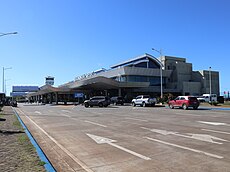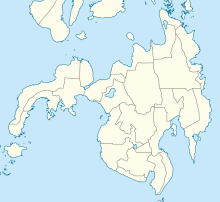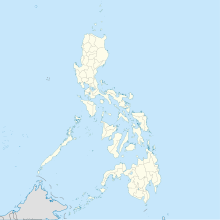Laguindingan Airport (IATA: CGY, ICAO: RPMY), also referred to as Laguindingan International Airport, is an international airport in Northern Mindanao that serves the cities of Cagayan de Oro, Iligan and Marawi, as well as the provinces of Misamis Oriental, Lanao del Norte and Bukidnon in the Philippines. The airport is Mindanao's second-busiest airport after Francisco Bangoy International Airport in Davao City.
Laguindingan International Airport Tugpahanan Pangkalibutanon sa Laguindingan Paliparang Pandaigdig ng Laguindingan Landing International a Laguindingan | |||||||||||
|---|---|---|---|---|---|---|---|---|---|---|---|
 Façade in December 2023 | |||||||||||
| Summary | |||||||||||
| Airport type | Public | ||||||||||
| Owner/Operator | Civil Aviation Authority of the Philippines | ||||||||||
| Serves | Northern Mindanao (except Misamis Occidental) | ||||||||||
| Location | Barangay Moog, Laguindingan, Misamis Oriental, Philippines | ||||||||||
| Opened | June 15, 2013 | ||||||||||
| Elevation AMSL | 58 m / 190 ft | ||||||||||
| Coordinates | 08°36′45″N 124°27′26″E / 8.61250°N 124.45722°E | ||||||||||
| Map | |||||||||||
 | |||||||||||
| Runways | |||||||||||
| |||||||||||
| Statistics (2023) | |||||||||||
| |||||||||||
Source: CAAP[1] | |||||||||||
While the airport is billed as an international airport, Laguindigan Airport is classified as a Class 1 principal (major domestic) airport by the Civil Aviation Authority of the Philippines (CAAP), a body of the Department of Transportation (DOTr) responsible for implementing policies on civil aviation to assure safe, economic and efficient air travel, and the handling of operations at airports (except major international ones).[2]
The airport sits on a 4.17 square kilometers (1.61 sq mi) site in Barangay Moog, Laguindingan,[3] and is 46 kilometers (29 mi) from Cagayan de Oro and 57 kilometers (35 mi) from Iligan. It opened on June 15, 2013, and replaced both Lumbia Airport (now Lumbia Airfield) in Lumbia, Cagayan de Oro and Maria Cristina Airport in Maria Cristina, Iligan.[4][5] Lumbia Airport now serves as a military air base for the Philippine Air Force, while Maria Cristina Airport in Iligan serves general aviation.
History
editFunding and implementation
edit| Sources of funds for the Laguindingan Airport Development Project[6] | ||||||||||
|---|---|---|---|---|---|---|---|---|---|---|
| Source of funds | Funds (in millions of US$) | |||||||||
| from the South Korea's Economic Development and Cooperation Fund | 30.60 million | |||||||||
| from the Export Credit Loan facility of the KEXIM | 62.75 million | |||||||||
| from the Philippine Government | 60.36 million | |||||||||
| for the Air Navigation and Support facilities from KEXIM[7] | 13.38 million | |||||||||
The airport project was implemented by the Philippine Government through the Department of Transportation and Communications. After the completion of the project, the airport was turned-over to the Civil Aviation Authority of the Philippines. The airport project envisages the development of new major trunkline airports compliant to international standards of safety and operations to meet the air transportation demand of the region.[8] The airport project also aims to boost economic activities, specifically of the Cagayan-Iligan Corridor, and expects to serve as the gateway to Northern Mindanao.
The approved cost of the airport project is US$167.09 million or ₱7.853 billion.[9] The cost was duly approved by the National Economic and Development Authority Board on August 30, 2007. Plans for the upgrade have existed since 1991 but have been stymied by land acquisition and financing problems. Although the Philippine Government has signed a US$25 million soft loan agreement with the South Korean government through its Economic Development Cooperation Fund, there has been difficulty in raising counterpart funding for acquisition of the estimated 300 hectares of land eventually required by the airport complex.
The Laguindingan Airport Development Project was inaugurated on January 10, 2006, with groundbreaking ceremonies presided by former President Gloria Macapagal Arroyo, who advocated the idea of an international airport along the Cagayan de Oro-Iligan Corridor.[10][11]
Construction and opening
editBy July 2007, the construction of the 4.4-kilometer (2.7 mi) four-lane access road had started to connect the new airport to the national road.
In early 2008, grading of the airport site area started. It was headed by the Department of Transportation and Communications and its foreign and local consultants, South Korea-based Yooshin Engineering Corporation and Ortigas Center, Pasig-based SCHEMA Konsult, Inc. respectively, and Hanjin Heavy Industries and Construction Company as the general contractor for the project.
Former President Benigno Aquino III expected that the opening of the airport would happen in April 2013.[12] However, on April 18, 2013, the DOTC announced that the opening would be pushed back to June 15, 2013[13] because CAAP had received requests from airlines to postpone the transfer until after the summer peak season, as an April 30 opening would require the cancellation of several daily trips.[14] It was inaugurated by President Aquino on June 13, 2013, two days before its opening.[15]
Contemporary history
editLaguindingan Airport was expected to facilitate night landings by December 2014, upon the completion of the installation of various navigational systems.[16] However, it was only on March 12, 2015, that the airport began to accommodate night flights. With this recent development, operating hours were increased to 5:00 am to 9:00 pm PHT from the previous 6:00 am to 6:00 pm PHT (sunrise-sunset) daily schedule.[17]
On October 20, 2017, Cebu Pacific launched the airport as its seventh hub, with its regional subsidiary Cebgo adding flights to Caticlan and Dumaguete from the airport.[18][19]
Philippine Airlines opened a Mabuhay Lounge at the airport in January 2018, but has been closed since March 2020 due to the COVID-19 pandemic.[20]
Future development
editUpgrading and expansion
editIn August 2013, the Project Development and Monitoring Facility Board had approved for the revision of the operations and maintenance of the airport. The operations and maintenance were already approved for funding but were revised to include the construction of a new terminal to the winning PPP bidder. The Department of Transportation and Communications was tasked to construct the terminal along with other airside civil works, air navigational facilities, landside building works, as well as other facilities. The revision is part of maintaining the airport on par with ICAO standards.[21]
According to the Civil Aviation Authority of the Philippines and airport manager Jose Bodiongan, the airport would become the “busiest regional transportation hub” with the installation of the runway lights, navigation equipment (required for nighttime flights) and the purchase of two new fire trucks.[22]
An expansion of the passenger and cargo terminals and parking lot are being planned. With the large South Korean presence in Cagayan de Oro, the regional Department of Tourism is eyeing flights from Busan to Cagayan de Oro via Singapore or a direct route from Busan to Cagayan de Oro to further bolster the tourism industry in the region.[23] The CAAP was set to initially approve Busan-Cagayan de Oro and Seoul-Cagayan de Oro flights by the fourth quarter of 2015, but these did not come to fruition.[24]
On February 26, 2019, Aboitiz InfraCapital Inc. was granted by CAAP an Original Proponent Status (OPS) for its unsolicited proposal for the airport's upgrade, expansion, operations, and maintenance.[25] After undergoing an unsuccessful Swiss challenge,[26] on September 30, 2024, the Philippine government awarded Aboitiz InfraCapital with a ₱12.75-billion contract to develop and maintain the airport beginning in April 2025.[27] On October 28, 2024, the concession agreement was signed.[28]
Aerotropolis
editAyala Land, who owned 183 of the 417 hectares of land acquired by the government to develop the airport complex, has future plans to develop an aerotropolis around the airport.[29][30] This is part of the pre-conditions granted by Civil Aviation Authority of the Philippines for expropriating the lands the government bought from the corporation.[3] Ayala Corporation, the parent company of Ayala Land, is one of the bidders in privatizing, through the public-private partnership scheme, the operations and maintenance of the airport.[31]
In September 2017, Ayala Land is set to build its first industrial estate outside Luzon within the planned aerotropolis.[32]
Structure
editPassenger terminal
editThe airport has a 7,184-square-meter (77,330 sq ft) passenger terminal building that can accommodate 1.6 million passengers a year.[31] The airport can accommodate 2,000 passengers a day.[33]
Runway
editThe airport has a single 2,100-by-45-meter (6,890 by 148 ft) runway which can accommodate four takeoffs and landings an hour.[34][35]
The runway is equipped with an instrument landing system, making it capable of night landings.[16]
Airlines and destinations
edit| Airlines | Destinations |
|---|---|
| Cebgo | Cebu, Davao |
| Cebu Pacific | Cebu, Iloilo, Manila |
| PAL Express | Cebu, Manila |
| Philippines AirAsia | Manila |
| Sunlight Air | Cebu |
Statistics
editData from Civil Aviation Authority of the Philippines (CAAP).[1]
| Year | Passenger movements | % change | Aircraft movements | % change | Cargo movements (in kg) | % change |
|---|---|---|---|---|---|---|
| 2013[a] | 1,016,463 | 4,654 | 12,117,303 | |||
| 2014 | 1,553,346 | 52.82 | 11,638 | 150.06 | 21,803,029 | 79.93 |
| 2015 | 1,756,445 | 13.07 | 13,702 | 17.74 | 25,983,455 | 19.17 |
| 2016 | 1,776,353 | 1.13 | 14,056 | 2.58 | 20,482,959 | 21.17 |
| 2017 | 1,814,644 | 2.16 | 15,802 | 12.42 | 17,604,861 | 14.05 |
| 2018 | 2,079,684 | 14.61 | 17,478 | 10.61 | 25,366,119 | 44.09 |
| 2019 | 2,310,473 | 11.10 | 18,202 | 4.14 | 26,767,261 | 5.52 |
| 2020 | 581,136 | 74.85 | 6,950 | 61.82 | 16,348,443 | 38.92 |
| 2021 | 611,469 | 5.22 | 7,080 | 1.87 | 13,984,133 | 14.46 |
| 2022 | 1,664,643 | 172.24 | 13,344 | 88.47 | 12,635,611 | 9.64 |
| 2023 | 1,990,201 | 19.56 | 14,764 | 10.64 | 17,729,059 | 40.31 |
- Notes
- ^ Data from June to December 2013.
Gallery
edit-
The view of the Laguindingan International Airport Terminal from its access road.
-
A Cebu Pacific Airbus A320-200 (registered as RP-C3266) is seen taxiing after being pushed back for departure bound for Manila.
-
The arrival area of Laguindingan International Airport.
-
The wing view from an Airbus A320 backtracking at the end of runway 09.
See also
edit- List of airports in the Philippines
- Lumbia Airport (former airport)
- Northern Mindanao
References
edit- ^ a b "Aircraft, Passenger, and Cargo Movements". Civil Aviation Authority of the Philippines. Retrieved October 20, 2022.
- ^ "Philippine Principal Class I/II Airports". Civil Aviation Authority of the Philippines. Archived from the original on July 2, 2014. Retrieved June 17, 2014.
- ^ a b Ma. Cecilia Rodriguez (July 22, 2007). "Waiting for the flight from Laguindingan". Philippine Daily Inquirer. Archived from the original on December 21, 2013. Retrieved August 8, 2013.
- ^ "Laguindingan airport in Misamis opens". ABS-CBN News. June 15, 2013. Retrieved August 8, 2013.
- ^ "Laguindingan airport to open on June 15". BusinessMirror. June 3, 2013. Archived from the original on August 25, 2013. Retrieved August 9, 2013.
- ^ "About the Laguindingan International Airport". Laguindingan International Airport. Retrieved August 8, 2013.
- ^ "Laguindingan airport fully operational by June 15". Malaya. June 4, 2013. Archived from the original on August 8, 2013. Retrieved August 9, 2013.
- ^ "Laguindingan Airport Development Project "On Schedule"". Laguindingan Airport Development Project. November 21, 2009. Archived from the original on August 9, 2017. Retrieved August 8, 2013.
- ^ Mike U. Crismundo (June 11, 2013). "Security tight in run-up to Laguindingan airport opening". Manila Bulletin. Retrieved August 9, 2013.
- ^ Louie Logarta (November 22, 2012). "Laguindingan Airport a tragedy waiting to happen". The Daily Tribune. Retrieved August 8, 2013.
- ^ Kris Bayos (June 10, 2013). "Laguindingan Airport opens June 15". Manila Bulletin. Retrieved August 8, 2013.
- ^ "Int'l Airport in CDO Opens in April – Aquino". Manila Bulletin. Yahoo! News Philippines. February 16, 2013. Retrieved August 8, 2013.
- ^ Gerry Gorit (June 11, 2013). "Laguindingan Airport to open June 15". GMA News. Retrieved August 8, 2013.
- ^ Edu Lopez (April 18, 2013). "DOTC resets transfer to new Cagayan de Oro Airport to June 15". Manila Bulletin. Civil Aeronautics Board. Archived from the original on July 11, 2015. Retrieved August 8, 2013.
- ^ Efren Montano (June 12, 2013). "PNoy inaugurates new Laguindingan airport". Journal Online. Retrieved August 9, 2013.
- ^ a b "Laguindingan Airport may see night flights by Dec". Port Calls Asia. June 23, 2014. Retrieved August 17, 2014.
- ^ "First night flight arrives at Laguindingan airport in Northern Mindanao". GMA News. March 13, 2015. Retrieved March 13, 2015.
- ^ Mike Baños (October 20, 2017). "CEB launches Laguindingan as 7th Regional Hub". Kagay-an. Retrieved October 20, 2017.
- ^ "Cebu Pacific Launches Laguindingan as 7th Hub" (Press release). CdoDev. October 20, 2017. Retrieved October 20, 2017.
- ^ "Domestic Lounge". www.philippineairlines.com. Retrieved February 5, 2021.
- ^ Cai U. Ordinario (August 7, 2013). "PDMF approves pre-feasibility funding for three PPP projects". BusinessMirror. Retrieved August 9, 2013.
- ^ "Laguindingan airport touted to become busiest regional transport hub". MindaNews. Retrieved August 3, 2015.
- ^ Mike Banos (March 13, 2014). "Still a long way to go for international flights in Laguindingan". Businessweek Mindanao. Retrieved March 13, 2014.
- ^ Pelone, Ruel Villanueva. "The web portal of BWM Group of Publications". www.businessweekmindanao.com. Retrieved August 1, 2015.
- ^ Galvez, Daphne (March 4, 2019). "Aboitiz awarded original proponent status for Laguindingan airport". Philippine Daily Inquirer. Retrieved March 4, 2019.
- ^ Jose, Ashley Erika (September 16, 2024). "Laguindingan airport contract goes to Aboitiz InfraCapital". BusinessWorld. Retrieved September 19, 2024.
- ^ "Aboitiz InfraCapital wins P12.75-B contract to operate Laguindingan Airport". Rappler. October 3, 2024. Retrieved October 3, 2024.
- ^ Maralit, Kristina (October 28, 2024). "Laguindingan International Airport concession agreement signed". The Manila Times. Retrieved October 28, 2024.
- ^ "Ayala Eyes Aerotropolis Concept for Laguindingan" (PDF). National Economic and Development Authority. September 16, 2011. Retrieved August 9, 2013.
- ^ "Ayala eyes Aerotropolis concept for Laguindingan". CDO Dev. September 19, 2011. Retrieved August 9, 2013.
- ^ a b "San Miguel keen on Laguindingan airport PPP". Rappler. June 13, 2013. Retrieved August 9, 2013.
- ^ Dumlao-Abadilla, Doris (October 2, 2017). "ALI to develop Mindanao ind'l estate". Philippine Daily Inquirer. Retrieved October 4, 2017.
- ^ Darwin G. Amojelar (June 3, 2013). "Laguindingan Airport to start operations on June 15". Interaksyon. Archived from the original on August 16, 2013. Retrieved August 9, 2013.
- ^ Ratunil, Elaine O. (February 27, 2013). "PNoy: P7.9-B airport will boost econ of M. Oriental". Philippine Information Agency. Archived from the original on August 8, 2013. Retrieved August 9, 2013.
- ^ "After 22 years, Laguindingan Airport starts commercial operation June 15". MindaNews. Mindanao Times. June 13, 2013. Archived from the original on March 4, 2016. Retrieved August 9, 2013.

